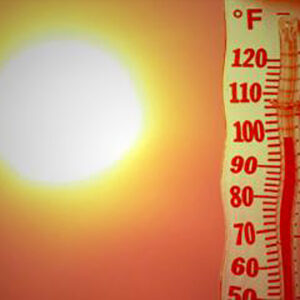
Tips for Beating the Heat
For more information, contact SRHD Public Information Officer, Kim Papich (509) 324-1539 or kpapich@srhd.org
SPOKANE, Wash. – Spokane’s hot and dry summer is about to get even hotter and local health and safety experts are reminding people hot weather can be more than just uncomfortable—it can pose a threat to people and pets’ health or even their lives.
While the area has experienced several “mini” heat waves this summer, National Weather Service Spokane (NWS Spokane) warns that the entire region can expect a more significant and long-lasting heat wave to develop this week. Daytime high temperatures are expected to reach the upper 90s to near 100° beginning Thursday and last through the weekend. Looking beyond Sunday, the area is expected to continue to experience above average temperatures well into next week.
Said NWS Spokane Warning Coordination Meteorologist, Andrew Brown, “While we're not expecting any daytime record-breaking temperatures at this point, the prolonged nature of this event is what makes it dangerous. Take extra precautions if you work or spend time outside.”
“Stay safe and healthy during hot weather. Know the signs of heat-related illness and the simple things you can do—like drinking plenty of water—to reduce your risk,” said Spokane Regional Health District health officer Dr. Bob Lutz.
Also, the temperature inside a parked car can reach more than 120 degrees in as little as 10 minutes. Direct sunlight and dark-colored interiors further speed the process. Children and animals should never be left in a parked car, even for a few minutes and even with the windows open. Get in the habit of always opening the back door to check the back seat before leaving a vehicle. Put something vital in the back seat, like a cell phone, purse, employee ID, etc. so the back door must be opened to retrieve the item when parking. Lock parked cars to prevent children from playing in them.
Children and seniors, the homeless, people with chronic illnesses, and people who take certain medications, such as blood pressure medications and even antihistamines, are especially at risk for problems with high summer temperatures.
People who exercise in extreme heat are more likely to become dehydrated and get heat-related illness, including heat stroke. Both athletes and spectators should know the signs of heat-related illness. It is important to stop all activity and get to a cool environment if feeling faint or weak.
Heat-related illnesses exist on a continuum, from mild problems - like heat cramps and heat exhaustion - to heat stroke, a potentially fatal condition.
Heat Exhaustion The symptoms of heat exhaustion may include dizziness or lightheadedness, weakness, lack of coordination, headache and nausea. Sweating is usually increased, and so is thirst, but this may not occur early enough to get people to drink more fluids. Being exposed to high temperatures for too long can also cause muscle cramps and swelling in the feet or ankles.
What to do: Get out of the sun and cool off. Splash cool/cold water on yourself, remove excess clothing and most importantly, drink plenty of cool water or fluids (but not alcohol or caffeine).
Heat Stroke Heat stroke is an emergency and requires immediate medical help—it can be fatal. The most important symptom to look for is a change in how a person is thinking – confusion is often accompanied by an elevated core body temperature. Other symptoms may include lightheadedness, weakness, dry and flushed skin, and an increased pulse. These symptoms can quickly progress and represent a medical emergency.
What to do: Call 911. Get the person out of the sun and heat and lay them down. Remove excess clothing and cool them as quickly as possible by applying ice or cold compresses to their neck, armpits and groin. If they are able to take in fluids, have them do so slowly, as nausea is common and vomiting may occur. Prompt medical attention is critical—people can die of heat stroke.
Other tips to avoid heat-related illness on hot days:
- Drink plenty of water or fruit and vegetable juices. Avoid caffeine or alcohol.
- Limit time outdoors, especially between 10:00 am and 3:00 pm.
- Be careful about doing a lot of outdoor activities when it is hot. Stay out of the sun, take frequent breaks, drink water or juice often, and watch for signs of illness.
- Dress for the weather. Loose-fitting, light-colored clothing is preferable to dark colors. Cotton and "technical" clothing can be cooler than some synthetics.
- In homes without fans or air conditioning, open windows to allow air flow, and keep shades, blinds or curtains drawn in the hottest part of the day or when the windows are in direct sunlight. Try to spend at least part of the day in an air-conditioned place like a shopping mall, store, library, friend’s house, or the movies. Cool showers can help, too. Do not use a fan when the air temperature is above 95 degrees -– it will blow hot air, which can add to heat stress.
Protecting Pets Spokane County Regional Animal Protection Service (SCRAPS) Director, Nancy Hill, reminds people, “The temperature does not need to reach hot summer heat temperatures to present an imminent danger to pets, especially pets in vehicles. Car temperatures rapidly increase and can overwhelm a pet in a very short time, and typically cracking a window or two is not enough.”
Anyone leaving a pet in a vehicle during warm weather may receive a $257 fine and/or criminal misdemeanor or felony charges for animal cruelty if the animal is harmed.
Hill also adds if a pet is an outside pet, “Remember to provide plenty of water and shelter from the sun.” SCRAPS offers dog houses for people who are in need and encourages people to keep pets indoors if possible.
For more information about avoiding heat-related illness, see the U.S. Centers for Disease Control web page. More information can also be found at www.srhd.org, on Facebook or Twitter @spokanehealth.
###
